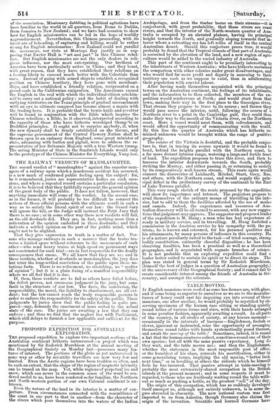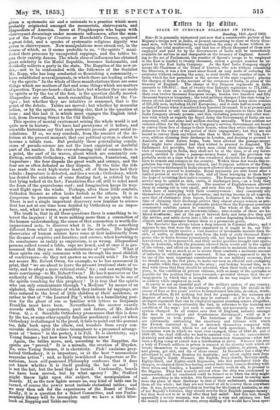TABLE-MOVING.
IF English mansions were roofed as some bee-houses are, with glass, and if some being as superior to ourselves as we are to the manufac- turers of honey could cast his inquiring eye into several of those mansions, one after another, he would probably be mystified by ob- serving specimens of the human race sitting or standing quietly round tables of various forms and sizes, with their hands arranged in some peculiar fashion, apparently awaiting a result. In all parts of the country, in all circles of society, at any leisure moment— occasionally in the intervals of business—Englishmen, foolish or clever, ignorant or instructed, seize the opportunity of arranging themselves round tables with hands systematically posed thereon, and await the moving of the table ! Sometimes, indeed, it is round a hat that the human creatures collect, sometimes round one of their own species ; but all with the same passive expectancy. Long do they wait, and the table moves not; and then the Englishman, whether the statesman in the most responsible post of office, or the humblest of his class, conceals his mortification, either in some generalizing terms, implying the old maxim, " better luck next time," or in levelling at others the ridicule which he himself feels he has incurred. That passive attempt in table-moving is probably the most extensively-shared occupation in the British islands at the present moment ; and in some respects it must be regarded, to those who are fruitlessly waiting round the table with- out so much as pushing a bottle, as the greatest "sell" of the day. The origin of this occupation, which has so suddenly developed itself amongst us, although not entirely unknown, is in some de- gree shrouded in obscurity. The now national custom was first imported to us from America, thoagh Germany also claims the origin of the invention. Scientific and learned Germans have given a systematic air and a rationale to a practice which more probably originated amongst the mesmerists, clairvoyants, and rhapsodists of America. Seers at Poughkeepsie who began with clairvoyant dreamings under mesmeric influences, after the man- ner of the Vestiges of Creation or Humboldt's &mos acquired a great éclat, and a species of systematic religious dignity, was given to clairvoyance. New manipulations were struck out, in the course of which, as it seems probable to us, " the spirits " mani- fested their presence by unexpected rappings, and the tables be- gan their oantrip dances. The whole class of influences has obtained great celebrity in the Model Republic, becomes fashionable, and decidedly collects a party in the state. The Rappites of the new or- der,—not to be confounded with the followers of the Socialist Mr. Rapp, who has long conducted so flourishing a community — have established severaljournals, in which there are leading artaoles " by the spirits." In the whole of these manifestations there are some things which are matters of fact and some things which are matters of question. Taps are heard—that is fact ; but whether they are made by spirits or by the toe of the foot, is the question chiefly mooted. Rhapsodies are effused, much resembling -Humboldt or the Ves- tiges ; but whether they are intuitive or crammed, that is the point of the debate. Tables are moved ; but whether by muscular action, or by the spirits, or something else, that is the question at issue : and this last it is which most engages the English intel- lect, from Downing Street to the Old Bailey. This species of mental excitement seizing the whole world is not quite new in history. We have had paroxysms of it before, and scientific historians say that such portents precede great social re- volutions. If so, we may conclude, from the amount of the de- lirium at the present moment, that our political system is about to become a tabula rasa. But probably these generalizing conclu- sions of pseudo-science are not the least empirical or doubtful part of the matter. In the ever-advancing tide of science there is a point, the surf of its waves, about which are constantly con- flicting, scientific Orthodoxy, wild Imagination, Fanaticism, and Imposture ; the four dispute the great waifs and eatrays, and the four are as often defeated as they dispute. By the time the tide has made its next high-water mark, all of them have had their rebuke : Imposture is detected, and lies a wreck ; Orthodoxy, which has denied the existence of some floating fact, is refuted by the fact lying naked at its feet; Fanaticism flies off, still to rebel amid the foam of the quarrelsome surf ; and Imagination keeps its way- ward flight upon the winds. Perhaps after these little combats, Orthodox Science as often looks foolish as the others. It is as dangerous to pronounce upon what cannot be as upon what is. There is not a single important discovery now familiar to science that has not at one time been derided by Orthodoxy as an impos- ture, and, what is worse, a puerility. The truth is that in all these questions there is something to in- terest the inquirer : if it were nothing more than a commotion of the human understanding, the cause of that commotion is worth dis- impassioned note, to discover what it is. It is often something different from what it appears to be on the surface. The highest discoveries of human science have come at first indistinctly. from the dreams of empirics and fanatics ; and science, when hastening to its conclusions as rashly as empiricism, is as wrong. Rhapsodical persona collect round a table, raps are heard, and at once it is pro- nounced that they are the manifestations of " spirits." What if these spirits can only commune with us through the most childish of contrivances—do they not answer as we could wish P Do they not assure Mr. Robert Owen, for example, as he has announced in print, that " we are about to leave the present irrational state of so- ciety, and to adopt a more rational state," &e. ; and can anything be more convincing—to Mr. Robert Owen? He has it moreover on the authority of Benjamin Franklin, whom he ascertains to be one of the spirits vouching for this prophecy ! It is true that the spirits who can only communicate through "a Medium" by means of an alphabet, the correct letters of which they indicate by tappings, are thus reduced to the level of little children at their accidence, or rather to that of ".the Learned Pig "; which is a humiliating. posi- tion for the ghost of one so familiar with letters as Benjamin Franklin must have been. Nevertheless, the answer exactly accords with the experiences, past and future, of Mr. Robert Owen. Q. e. d. Scientific Orthodoxy pronounces that this is done by the toe, or some other equally familiar machinery; and yet when Orthodoxy is challenged to the proof, it fails to point out the pecoant toe, falls back upon the elbow, and wanders from every con- ceivable device, until it retires triumphant to a presumed arrange- ment of " bones " in the pocket, a la PelL It is electricity, says Young Science ; but how does Young Science know P
Again, the tables move, and, according to the Rappites, the spirits are " proved." It is a miracle, the creation of Hayden.
islo, cries Young Science, it is electricity. Pish ! exclaims grey- haired Orthodoxy, it is imposture, or at the best " unconscious i muscular action" ; and, as fairly bewildered as Imposture or Fa- naticism, keen self-possessed Philosophy confesses that it does not know whether it is itself pushing the hat or not ! It is not the hat, but the head that is turned. Confessedly, boards too have been moved, but by what agency ? Mr. Stafford might throw light upon this subject, the manipulation of Boards. If, as the new lights assure us, any kind of table can be turned, of course the power must include statistical tables • and we may then ask for the experiences of the Board of tables; Really, it is a question for a Select Committee, and our Parlia- mentary library will be incomplete until we have a thick blue- book on Rapping and Table-moving.



































 Previous page
Previous page